

Turing's Enduring Importance. When Alan Turing was born 100 years ago, on June 23, 1912, a computer was not a thing—it was a person.
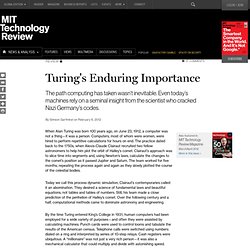
Computers, most of whom were women, were hired to perform repetitive calculations for hours on end.
The Web. Modelling behaviour: Game theory in practice. Information and Contemplative Thought - We Turn Ourselves Into Media Creations. Advertising is a poison that demeans even love – and we're hooked on it. We think we know who the enemies are: banks, big business, lobbyists, the politicians who exist to appease them.
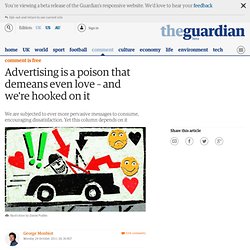
But somehow the sector which stitches this system of hypercapitalism together gets overlooked. That seems strange when you consider how pervasive it is. In fact you can probably see it right now. It is everywhere, yet we see without seeing, without understanding the role that it plays in our lives. I am talking about the industry whose output frames this column and pays for it: advertising. The Myth of the Disconnected Life - Jason Farman - Technology. The new year is now well underway and many people have probably already broken the resolutions they made to disconnect from their digital devices more often and reconnect with the people and places immediately around them.
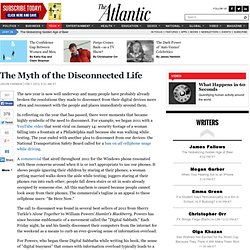
In reflecting on the year that has passed, there were moments that became highly symbolic of the need to disconnect. For example, we began 2011 with a YouTube video that went viral on January 14: security footage of a woman falling into a fountain at a Philadelphia mall because she was walking while texting. The year ended with another plea to disconnect from our devices: the National Transportation Safety Board called for a ban on all cellphone usage while driving.
A commercial that aired throughout 2011 for the Windows phone resonated with these concerns around when it is or isn't appropriate to use our phones. Alan Turing: why the tech world's hero should be a household name. 17 June 2012Last updated at 20:27 ET By Vint Cerf Turing Award winner / Chief internet evangelist, Google.
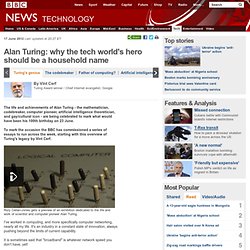
Information explosion: how rapidly expanding storage spurs innovation. Moore's Law gets all the press.

It's easy to present even to non-technical readers, and the way it's most often expressed is something like, "computers double in speed every year," though that's a bastardization of the axiom, which actually states that the transistor count of integrated circuits tends to double every eighteen months or so. This formulation does succinctly capture how fast computers have gotten in so short a time. But integrated circuit density hasn't been the only computing tech which has shown extremely rapid progress over the past thirty years. Consider magnetic storage. Modern hard drives are precisely manufactured miracles, products of billions of dollars and decades of research into magnetism and quantum mechanics, squeezing ludicrously large amounts of data into ludicrously tiny spaces.
Are we on information overload? The last two decades have completely transformed the way we know.
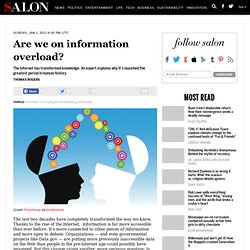
Thanks to the rise of the Internet, information is far more accessible than ever before. It’s more connected to other pieces of information and more open to debate. Is Technology Destroying Your Relationships? I walked in the door and the hostess of the party in the posh Venice Beach apartment rushed to greet me.

She introduced me to the woman who'd walked in at the same time as a prolific sex writer who was going to write a steamy novel to dethrone Fifty Shades of Grey. I had no plans to do this, but that's the way of parties. I certainly fared better than my friend Jordan, who was also there, and who was repeatedly introduced by someone else as Dick Feyman, winner of a Nobel in "something no one wants to hear over drinks. " The woman to whom I'd been introduced listened to the hostess dish about my fascinating, though occasionally dark pieces. "I make dark films sometimes," she told me, with a smile that contradicted everything about the statement. The Age of the Viral Idea - Bill Davidow - Technology. Thought contagions, accelerated by the Internet, push economies to the brink, burst housing bubbles, and propagate unsettling, radical ideologies The Internet Age has brought with it a glut of contagions.
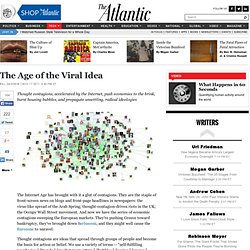
They are the staple of front-screen news on blogs and front-page headlines in newspapers: the virus-like spread of the Arab Spring; thought-contagion-driven riots in the UK; the Occupy Wall Street movement. And now we have the series of economic contagions sweeping the European markets. They're pushing Greece toward bankruptcy, they've brought down Berlusconi, and they might well cause the Eurozone to unravel. Thought contagions are ideas that spread through groups of people and become the basis for action or belief. Instant messengers. Histories of momentous events are being written more rapidly.
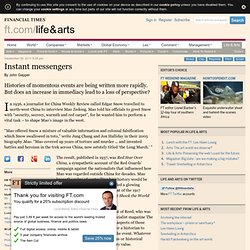
But does an increase in immediacy lead to a loss of perspective? In 1936, a journalist for China Weekly Review called Edgar Snow travelled to north-west China to interview Mao Zedong. Mao told his officials to greet Snow with “security, secrecy, warmth and red carpet”, for he wanted him to perform a vital task – to shape Mao’s image in the west. “Mao offered Snow a mixture of valuable information and colossal falsification which Snow swallowed in toto,” write Jung Chang and Jon Halliday in their 2005 biography Mao. “Mao covered up years of torture and murder ... and invented battles and heroism in the trek across China, now astutely titled ‘the Long March.’ ” The result, published in 1937, was Red Star Over China, a sympathetic account of the Red Guards’ campaign against the nationalists that influenced how Mao was regarded outside China for decades. You Say You Want a Devolution? Why Your MP3s Sound Bad: High-Resolution Audio Explained.
Neil Young made waves this week with some comments about digital music files—first at the Sundance Film Festival, and then later in an All Things D interview.

But lost in the media frenzy is his real point. Young wasn't putting down all digital music. 6 Terrifying User Agreements You've Probably Accepted. How many user agreements have you clicked through in your life without reading them? We're going to guess it's one for every single piece of software you've ever used, and every gadget, and Lord knows what else. Massive Energy Storage Technologies Could Revitalize the Power Grid. To see the big obstacle confronting renewable energy, look at Denmark. The small nation has some of the world’s largest wind farms. Yet because consumer demand for electricity is often lowest when the winds blow hardest, Denmark has to sell its overflow of electrons to neighboring countries for pennies—only to buy energy back when demand rises, at much higher prices.
As a result, Danish consumers pay some of the highest electricity rates on the planet. Utilities in Texas and California face a similar mismatch between supply and demand; they sometimes have to pay customers to take energy from their windmills and solar farms. On paper, wind and sun could supply the U.S. and some other countries with all the electricity they require. Select an option below: Customer Sign In *You must have purchased this issue or have a qualifying subscription to access this content. Research, no motion: How the BlackBerry CEOs lost an empire. 432 in Share Jump To Close Research In Motion, whose BlackBerry phones pioneered wireless email, no longer holds the commanding heights in the smartphone market. With Android, iOS, and even Windows Phone gaining market share, the Waterloo, Ontario, company finds itself in a battle for relevancy. The BlackBerry is dead. Could Research in Motion bring it back to life by partnering with Microsoft?
Photograph by Nicholas Kamm/AFP/Getty Images. Research in Motion has been dying for so long that it feels cruel to dwell on its turn for the worse. But the earnings report that the company put out last week was so disastrous—so much more terrible than anyone expected—that it now looks like RIM has passed the point of no return. Shipments of BlackBerry smartphones declined by 41 percent since last year, RIM said. Wall Street analysts had been expecting the company to break even during the quarter; instead, it lost half a billion dollars. Instagram, Kodak and the end of innovation. Light-Field Photography Revolutionizes Imaging. In place of film and pinholes, the Lytro camera uses a thin sheet containing thousands of microlenses, which are positioned between a main zoom lens and a standard 11-megapixel digital image sensor.
How Hewlett-Packard lost its way. DNA computing: Computing with soup. Bits of the Future: First Universal Quantum Network Prototype Links 2 Separate Labs. Quantum technologies are the way of the future, but will that future ever arrive? Is Origami the Future of Tech? The Manifest Destiny of Artificial Intelligence. Sometimes Customers Are Pretty Stupid - Justin Fox. By Justin Fox | 10:28 AM March 21, 2012 The only sustainable way to build a business these days, we are told, is to be straight with your customers.
Magazine - Messing With Fate. New “social discovery” apps try to engineer chance encounters. Special Report: The Sony Schism. iEmpire: Apple's Sordid Business Practices Are Even Worse Than You Think. Photo Credit: Shutterstock. Microsoft store: It’s a blatant rip-off of the Apple store, and it just might save the company. Farhad Manjoo/Slate. Three years ago, shortly after Microsoft announced that it would launch its own retail stores, I offered the company some unsolicited advice: Copy Apple “relentlessly, unabashedly, and completely.” What retail is hired to do: Apple vs. IKEA.
Apple’s Tax Strategy Aims at Low-Tax States and Nations. What Amazon's ebook strategy means. The Bathrobe Era: What the Death of Print Newspapers Means for Writers. The world's quietest place is a chamber at Orfield Laboratories. Lewis Lapham, Machine-Made News. The End of the Future - Peter Thiel. Cutting the cord: how the world's engineers built Wi-Fi. Ohm Run: One-Atom-Tall Wires Could Extend Life of Moore's Law. Silicon Superego. Paul Allen: The Singularity Isn't Near. How to Build a Computer Model of God. AI robot: how machine intelligence is evolving.
Creating Artificial Intelligence Based on the Real Thing. We're Underestimating the Risk of Human Extinction - Ross Andersen - Technology. The Perils of Copy Protection. Intellectual Ventures And The War Over Software Patents : Planet Money. The ‘broken patent system’: how we got here and how to fix it. Patent Trolls: How Bad Is the Problem? Article One Partners: How a bunch of amateur sleuths are stamping out patent trolls. Oracle v. Google Shows the Folly of U.S. Software Patent Law.
Adam Yauch and Paul’s Boutique: How dumb court decisions have made it nearly impossible for artists to sample the way the Beastie Boys did. The Gossip Machine, Churning Out Cash. 5 Old-Timey Prejudices That Still Show Up in Every Movie. Unethical journalism: The depressing tale of Johann Hari.